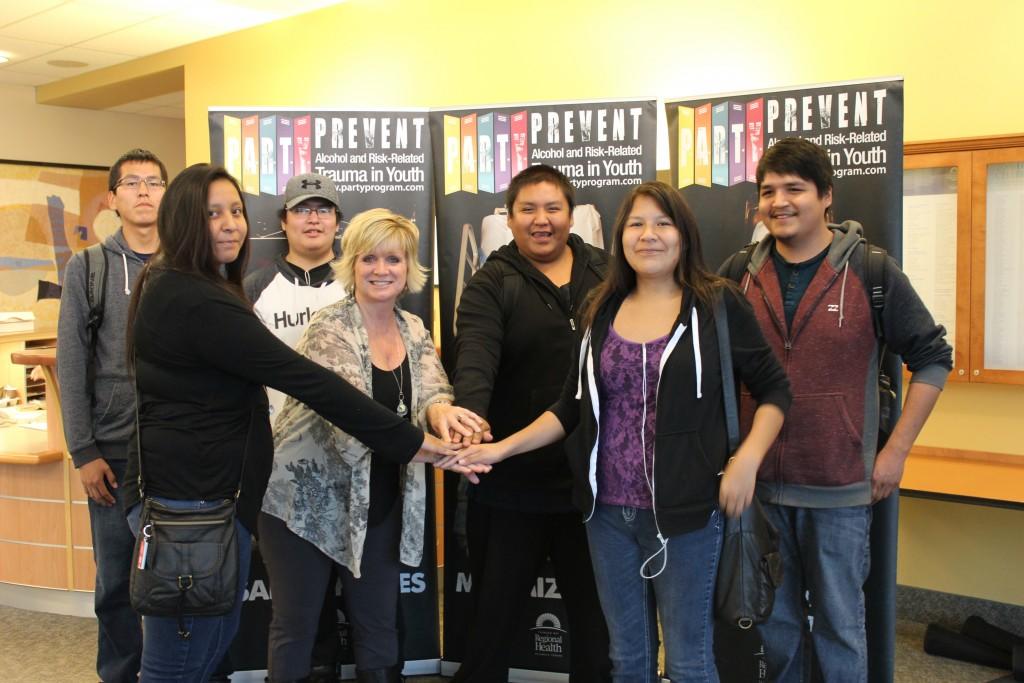Matawa Students Join the P.A.R.T.Y.
by Maryanne Matthews
 Students from Mawata Learning Centre attended the Health Sciences Centre’s P.A.R.T.Y program on Wednesday, October 5th. Throughout the day-long event, students were encouraged to make safer choices when it comes to high risk behaviours.
Students from Mawata Learning Centre attended the Health Sciences Centre’s P.A.R.T.Y program on Wednesday, October 5th. Throughout the day-long event, students were encouraged to make safer choices when it comes to high risk behaviours. What this particular P.A.R.T.Y. lacks in music and games, it makes up for in valuable knowledge and prevention. That’s what students from Matawa Learning Centre learned by attending Thunder Bay Regional Health Sciences Centre’s P.A.R.T.Y. (Prevent Alcohol and Risk-Related Trauma in Youth).
The P.A.R.T.Y. program is designed to encourage youth to make safer choices when it comes to high risk behaviors. Students attend a day-long event that includes several sessions that are specifically designed to meet the needs of the targeted audience. Topics covered include Substance Abuse and addictions, police and EMS perspectives and laws, and injury survivor stories. Students also see the Hospital’s Trauma Room and morgue, where reality really hits home. The day usually ends with a presentation from our Regional Coroner, Dr. Michael Wilson, speaking about many cases where “teen fun went terribly wrong”.
The mandate to deliver the P.A.R.T.Y. program to students from Matawa Learning Centre (MLC) as well as Dennis Franklin Cromarty High School (DFCHS) stemmed from a recommendation from the inquest into the deaths of seven Indigenous students in Thunder Bay. This particular recommendation has the full support of Matawa Learning Centre.
“It’s important for our students to participate in the P.A.R.T.Y. Program because it provides a reality based approach to the many downsides of risky and self harming behaviour,” said Brad Battiston, Principal, MLC. “This program provides a visual representation of what the possible after math looks like when engaging in these types of behaviours and activities. It also provides access to experts that our students would not normally meet with or have the opportunity to participate in group discussions with.”
Battison hopes his students gained a serious understanding of what can happen to them if they participate in negative and/or risky behaviour. “I believe it was a wake up moment for them, showing that they are not immune from something bad happening to them if they were to engage in these types of activities,” he said. “I really think this has been a positive experience as it will make them think about their actions and the possible consequences. Success is difficult to define, but I am sure it will be part of their thought process.”
Shonath Kajorinne, P.A.R.T.Y. Program Coordinator with the Hospital, knows how important it is for students to understand the dangers associated with risky behaviours, including the use of alcohol and drugs, and is thrilled to be offering this event to Indigenous students.
”It is crucial as a Regional Trauma Hospital to recognize and define any specific concerns that face our community/region, and then work collaboratively within our organization to develop strong supports, relationships and solutions to youth harm reduction in general,” said Kajorinne. “The recent inquest into the seven Indigenous students has identified some specific areas of concern for Indigenous Youth that I feel our Hospital and P.A.R.T.Y. Program can address. It is wonderful to be a part of something that can make a difference and it’s also quite gratifying to work for an organization that fully supports Injury Prevention. I am excited to see the future development of the P.A.R.T.Y. Program for the Indigenous Youth and to work with the many community partners that share this vision!”
To learn more about the P.A.R.T.Y. program, please visit http://www.tbrhsc.net/programs-services/trauma-program/party-program/.